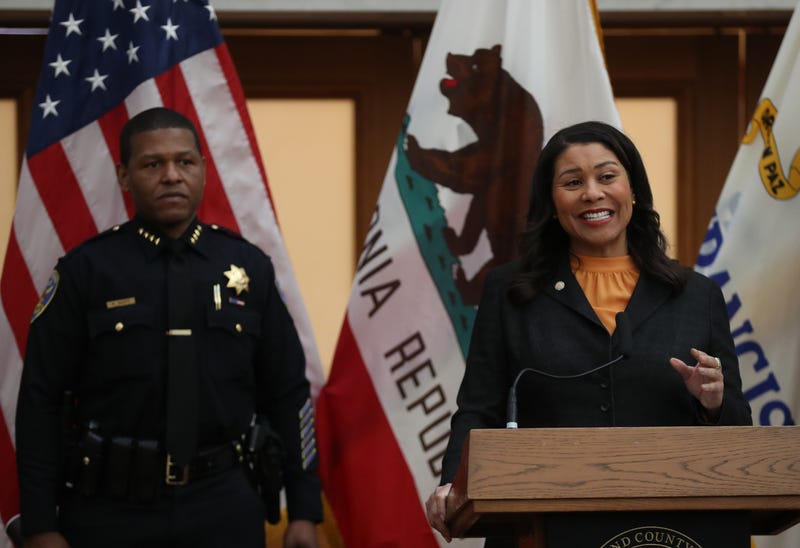
SAN FRANCISCO (KCBS RADIO) – Civil liberties advocates are raising red flags over the San Francisco mayor's proposal to expand police access to use non-city-owned cameras for live surveillance during criminal investigations and some public events.
Mayor London Breed announced legislation on Wednesday that would allow the San Francisco Police Department temporary access to non-city cameras in investigations of "active misdemeanor and felony violations" and during "large or high-profile events" in San Francisco where police manage street closures, barricades, crowd control or escort public figures, among other circumstances.
Breed introduced the legislation after pulling a ballot measure in March that would've broadened the circumstances in which police could use surveillance in real time. Supervisor Aaron Peskin also pulled a competing measure that same month, and he said Wednesday that the lawmakers collaborated on the new proposal with aims of "ensuring an effective response to crime on our streets while safeguarding against the real threats of a surveillance state."
The Electronic Frontier Foundation and the ACLU of Northern California told KCBS Radio on Wednesday that the legislation’s guardrails aren’t strong enough.
"We do believe that a policy can exist with civil rights and privacy concerns," Saira Hussain, Staff Attorney with the EFF's civil liberties team, said in an interview on Wednesday. "However, the mayor and the SFPD have not shown that the current policy that they've put forward actually considers either of these two."
Under the proposal, police must cut their connection to the cameras within 24 hours but can keep security footage obtained as part of a criminal investigation for up to two years.
ACLU Staff Attorney Matt Cagle said in an emailed statement to KCBS Radio that the proposal lacks "strong limits" on how the footage is shared or cameras are used.
"Our leaders should refuse to give the police sweeping authority to spy on us," Cagle wrote. “And any San Franciscan who cares about our First Amendment rights and doesn't want to be enlisted in the SFPD's surveillance program should oppose the proposal in its current form.”
Breed introduced the proposal amid concerns about crime in the city, and just shy of three weeks before District Attorney Chesa Boudin's recall election. The San Francisco Chamber of Commerce, which backs Boudin's recall, said 83% of city voters polled said crime has gotten worse over the last two years.
Rodney Fong, the chamber's CEO, told KCBS Radio on Wednesday that he believes the legislation could serve as an effective prevention measure while also improving public perception about the city.
"We want to send a message to the world that San Francisco's a great city to live in and a great city to visit," Fong said. "And so adding these measures and these tools to prevent crime, stop crime, solve crime is fantastic."
Hussain and Cagle said they fear police will use non-city cameras to record protestors, which they said could have a chilling effect on speech.
Although Breed’s proposal bars such live surveillance of First Amendment activities unless there are "redeployment needs due to crowd sizes or other issues creating public safety hazards," the duo noted police used non-city cameras in Union Square to record demonstrators following George Floyd's murder two years ago. A judge ruled in February the surveillance was legal.
Earlier this month, Motherboard obtained a San Francisco police training document that said police investigators have obtained and used footage from autonomous vehicles "several times."
"We're seeing policies that have not been thought through very well that leave much room for abuse or misuse, and particularly that put people's civil liberties and civil rights at risk," Hussain said. "It's part of a continuation of a pattern, and what's really noticeable is that the mayor's office hasn't put forward a single shred of evidence that using these cameras for live surveillance will curb crime."

Follow KNX News 97.1 FM
Twitter | Facebook | Instagram | TikTok



